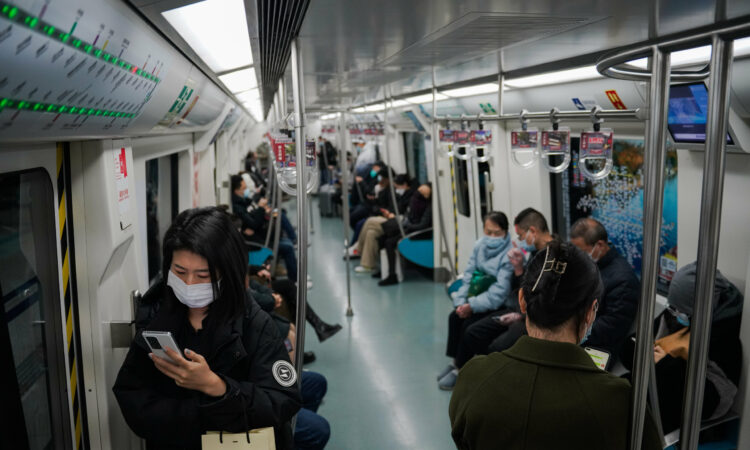
Predictions of imminent and apparently inevitable ‘major economic crisis’ in China have been made ever since the country entered its era of post-Mao growth. Some China-watchers argue the nature of the Chinese Communist Party and its state-centric approach will sooner or later lead to economic decline; others point to the country’s demographic problems and its falling productivity.
Indeed, the Chinese economy’s major structural weaknesses are nothing new, from its growing debt to its unsustainable property market. But two new elements may really herald the end of China’s rapid economic rise: Beijing’s erratic response to the pandemic; and the deteriorating domestic and international political climate, which seriously constrains the Chinese leadership’s room for manoeuvre – and which is a situation at least partly of its own making.
At the beginning of this year, the Chinese government put an abrupt end to its severe ‘zero-covid’ policy. This move provided a short-lived economic rebound, but the momentum quickly dissipated. By July, macroeconomic data was showing a faster than expected deterioration in the housing market, alongside low retail sales and investment. As a result, international financial institutions cut forecasts for China’s 2023 GDP growth to around 4.5 per cent from almost 5 per cent. In the context of China’s economic rise, this is a significant drop; yet even this may prove optimistic.
China’s brutal domestic handling of the pandemic saw the country endure unpredictable lockdowns and arbitrary enforcement of different rules and standards. This seems to have led many Chinese households to anticipate more hard times ahead rather than spend the savings they set aside during the pandemic, in contrast to their counterparts in the West. The result is “economic long covid”, on a scale unlike anything seen elsewhere. Together with record-high youth unemployment and declining fertility rates, as well as memories still fresh of last year’s social unrest on the streets, Chinese public sentiment is distinctly downbeat.
When China faced the challenge of the 2008 global financial crisis, it was able to implement an ambitious stimulus package focused on infrastructure development and reconstruction works. One serious side-effect of hurriedly mass-building bridges, airports, and high-speed railways was the creation of a property bubble, which has now already popped. Another large stimulus scenario is therefore highly improbable. Instead, China seems to be doing little more than making minor tweaks, such as trimming its foreign currency deposit reserves to support the renminbi. Beijing has also been implementing its ‘dual circulation strategy’, which focuses on promoting domestic spending while developing partnerships with select foreign partners. Yet this too is likely to make only a marginal difference in the context of the current downturn.
Today, rather than the all-out pursuit of growth, the Chinese leadership’s principal goal is to insulate the country from external shocks
Today, rather than the all-out pursuit of growth, the Chinese leadership’s principal goal is to insulate the country from external shocks and increase its economic and technological self-reliance – even if this comes at a cost. It means more concentrated efforts to build up China’s high-tech industry, which has been negatively affected by US restrictions, along with a drive to stimulate innovation in strategic sectors.
The gloomy international environment only complicates the situation for Beijing even further. Back in 2008, many, including in China itself, saw Chinese stimulus policies as a way of pulling the world out of the crisis. But this “shock-absorbing function” of an aspiring ‘responsible power’ is a thing of the past: in an environment now dominated by the weaponisation of economic ties, war in Europe, and growing tensions between Washington and Beijing, China is trying to selectively limit its dependence on the outside world. In support of this, the Chinese leadership is turning the country inward, pumping up the nationalist rhetoric, and pointing to security concerns to justify the country’s worsening economic performance in the face of adversaries both real and imagined. For example, many observers believe a campaign led by Chinese diplomats and state-affiliated media against Japan’s allegedly irresponsible treatment of water connected to the Fukushima disaster was a concerted effort to direct public attention away from China’s domestic problems.
Thus, by completely reorientating its foreign policy towards strategic rivalry with America, China has hampered itself in other policy areas. Crucially, by dialling up its anti-US rhetoric and implementing revisionist policies, the country has lost credibility among many in the West, including in Europe. With China’s ‘responsible power’ claims long gone, many foreign investors are unwilling to look twice.
Europeans should absorb the lessons of the country’s inward turn. Beijing will inevitably try to put right its relations by attempting to convince Europeans that China has not fundamentally changed; that it remains a reliable and open partner. Yet the reality is that China will conceal its true motives from Europeans. And given Xi Jinping’s tight grip on power, Chinese behaviour is likely to remain unpredictable, as with the zero covid policy and eventual exit thereof, with all the implications it has had for China’s economy and society. As they shape their China policy, European decision-makers should embrace, or at least acknowledge, this increased unpredictability – and prepare for the era of China the introverted superpower.
The European Council on Foreign Relations does not take collective positions. ECFR publications only represent the views of their individual authors.






